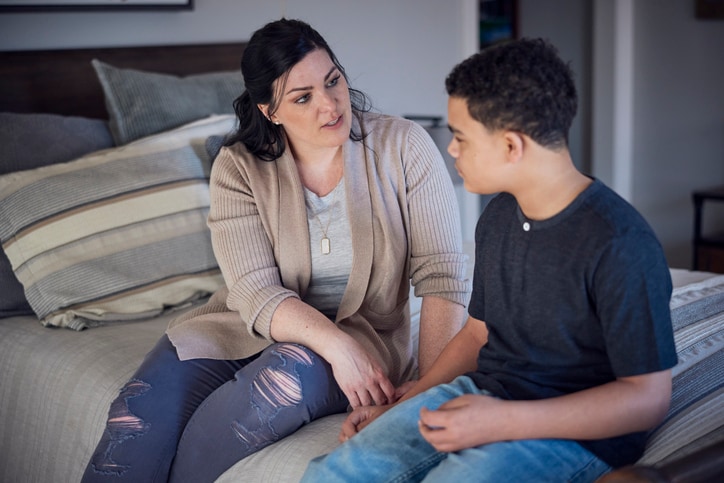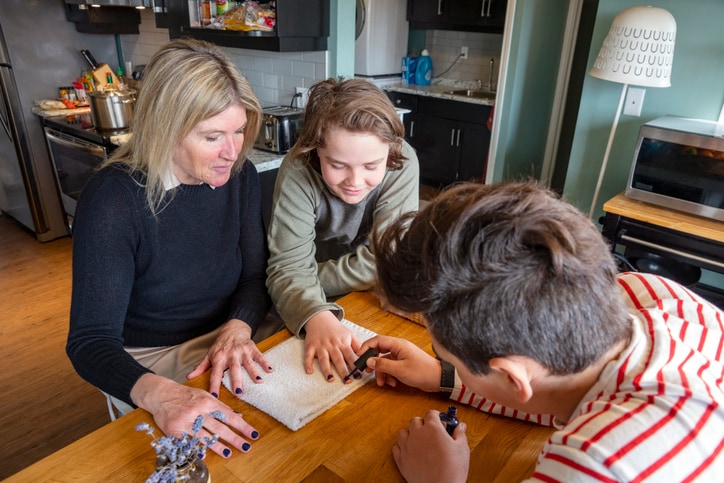For over two years, families have anticipated a return to normalcy following the peak of the COVID-19 pandemic. But as schools fully reopened and kids’ extracurricular and social lives have resumed business as usual, it’s become painfully apparent that adolescents, in particular, are struggling mentally and emotionally. “We’re seeing an increase in depression and anxiety and real social changes in how kids are interacting with their friends,” says Jennifer L. Hartstein, a nationally known child, adolescent and family psychologist.
Research published in March 2022’s Journal of Adolescent Health echoes Hartstein’s observation, noting that “poorer quality and functioning of family relationships, more screen time and witnessing discrimination in relation to the pandemic” are all correlated with a spike in youth distress.
And this occurred on the heels of a mental health crisis among young adults that was already in full swing prior to the pandemic. “Heading into the pandemic, anxiety and depression was going up for teens, and then, it was like everybody went into a snow globe and we just stirred it up and spun it around, which exacerbated and accelerated the problem,” says Hartstein.
In short, the traumatic times we’re living through has had a lasting, troubling effect on teens who were already at risk. Here, how you can spot the signs that your tween and teen needs help, talk about it and find them the support they need.
“Heading into the pandemic, anxiety and depression was going up for teens, and then, it was like everybody went into a snow globe and we just stirred it up and spun it around, which exacerbated and accelerated the problem.”
— JENNIFER HARTSTEIN, CHILD, ADOLESCENT AND FAMILY PSYCHOLOGIST
How your adolescent might show you they’re struggling
Parents tend to be adept at noticing — and acting on — red flags, points out Hartstein. For example, say your teen starts talking about not wanting to live anymore. In that case, Hartstein says it’s imperative to take kids at their word, and ask, “Can you be safe?” “And if they say, ‘I don’t know,’ do not pass go, do not collect $200, go to the emergency room,” says Hartstein. “Better that you go to the emergency room, have someone assess them, and then they say, ‘They’re OK.’”
But it’s also crucial for parents to keep an eye out for yellow flags as well, she explains.
Yellow flags parents should watch out for
Yellow flags are likely smaller behavioral changes, says Hartstein. A few examples:
- Maybe your adolescent was super meticulous about their appearance, and now they’re not really interested in getting out of their sweatpants or doing self-care routines that they might have had in the past.
- They’re usually pretty social, but when an opportunity to go out with their friends comes up, they politely decline, and they are in their room more than usual.
- Maybe they’re ruder or more impatient or irritable than usual.
Still, it bears noting that all of these behaviors exist on a continuum. “Some of it is typical adolescent mishegoss, and some of it feels like more than that,” notes Hartstein.
While you don’t want to overreact over a minor incident or pattern of behavior, it’s important to listen to your gut. “You are the expert on your kids,” says Hartstein. “if your gut’s saying, ‘Something does not feel right,’ you’re probably right. Trust yourself as a parent. If you’re worried, explore it.”
“If someone is always good, we need to ask, ‘How are you really?’ And then stop talking.”
— JENNIFER HARTSTEIN
Why it’s worth paying attention if your child seems too OK
Teens are notorious for putting up a front when they’re struggling, which is why Hartstein says it’s important to notice when they seem to be doing too well, given the traumatic times they’re living through. It could be that they’re hiding their struggle because there’s already a lot of stress at home or they have a reputation for being able to handle whatever it is they’re going through.
“When the world is a dumpster fire, and your kid’s like, “No, I’m good,” that’s something to look at,” she notes. “We all hit a wall at some point during the pandemic. Being in flux for extended periods of time does a job on our nervous system. So if someone is always good, we need to ask, ‘How are you really?’ And then stop talking.”
She encourages parents to really create space to listen. “We often do a ‘how are you?’ and then, we’re onto the next thing, right? We don’t listen to the answer. We don’t hear the nuance.”
And it matters where you have this conversation. “It can happen in the car, when you’re taking a walk, when you’re sitting next to one another on the couch watching TV,” says Hartstein. “They might be more comfortable sitting next to you or walking next to you where they don’t have to make eye contact.”
You might also be busy doing something at the kitchen table or in your office, and they’re lurking in the doorway. “Stop what you’re doing and talk to them,” says Hartstein. “Lurkers expect you to notice them, but they’re not really saying what they need.”
How to talk about your adolescent’s mental well-being
If you suspect your teen is struggling, consider taking these steps to kick off a productive conversation.
Validate how they feel — and then ask them what they need
When it comes to showing up for your adolescent and getting them the help they need, Hartstein emphasizes the need, first and foremost, to accept that they’re struggling and validate their experience. Then, determine whether they simply need to be heard or if they need you to help them problem-solve.
Hartstein explains that you can say to your adolescent: “I need to know how you need me to listen. Am I hearing you and being in it with you? Or am I helping you fix or solve the problem?”
“Our urge as adults in the lives of children is to fix a problem, and maybe they really just want you to go, ‘That’s a bummer. I’m really sorry,’” she explains.
Strive to ask open-ended questions
Anyone raising a tween or teen knows full well that questions like, “Hey, are you doing all right?” or “Is everything OK?” often result in a “yep” — which is the conversational equivalent of a dead end.
That’s why Hartstein urges parents to focus on open-ended inquiries that point to specifics. Perhaps you say, “Hey, I’ve noticed that even when you have an opportunity to go out with your friends, you’re not going. That seems out of character. What’s going on?”
Know when to back off but keep trying
You might still get responses like “I’m fine” or the time-honored “Leave me alone” or “Go away.” And it can be tough to back off when your gut is giving you information, acknowledges Hartstein. But that’s when you can say something like, “Look, I hear what you’re saying, but my gut is giving me different information. So I’m going to keep checking in, because something’s telling me that that something’s off. I just want you to know, I’m paying attention, and I see you.”
And remember, delivery is everything. You don’t want to channel the antagonizing principal in “The Breakfast Club.” “It’s very much from a warm place of like, ‘I am noticing a change, and I’m aware of it. As your parent, I love you, and I will hold space for you. I want to make sure you’re OK. And let me know what I can do,’” says Hartstein.

How to find support for your tween or teen
If your child is asking for support, Hartstein encourages parents to try the following routes:
Talk to trusted experts
This might mean connecting with your child’s pediatrician, school counselor or even your own friends who have teens too. “Word of mouth is an amazing way to get to clinicians and therapists,” says Hartstein.
Check with your insurance
Although the mental health world is so overloaded right now, Hartstein encourages parents to see if their child’s insurance offers any coverage, resources or referrals to mental health care providers.
See if a mentor can step in
Think about reaching out to an authority figure in your child’s life, like a trusted coach or camp counselor. “Say, ‘Hey, my kid’s really struggling. Can you talk to them and see how they’re doing and check in? Because they really trust you, and I think they’ll talk to you about what’s going on,’” suggests Hartstein.
Ultimately, as challenging as it might be to face this issue head-on, it’s important for parents to know that it’s not their fault, says Hartstein. “Being a young adult is hard, and these are truly unprecedented times,” she acknowledges. As long as you’re holding space for your teen, validating their experience and offering to help them problem-solve when necessary, you’re right on track.






